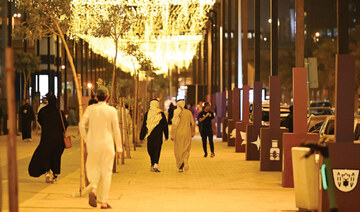Ramadan in Saudi Arabia: A Fusion of Tradition and Modernity
As the holy month of Ramadan approaches, Saudi Arabia is once again embracing the essence of tradition while adapting to the evolving demands of a digital era. The convergence of cultural roots with digital convenience is reshaping consumer expectations across the Kingdom, which has a population of 38 million, of whom 70 percent are under the age of 35.
Brands are now tasked with infusing core values such as personalization, community engagement, and generosity into the shopping journey to resonate with this tech-savvy and culturally rich demographic. With the Kingdom’s digital commerce market valued at $14 billion in 2023 projected to reach $20 billion in 2025, a compound annual growth rate of 20 percent is expected.
E-commerce Rush in Saudi Arabia During Ramadan
According to Janahan Tharmaratnam, partner at Arthur D. Little Middle East, the Kingdom’s digital commerce market is experiencing a significant surge during Ramadan. The period alone accounts for 35-40 percent higher transaction volumes, driven by a surge in demand for groceries, electronics, fashion, and gifting.
"The post-pandemic shift to online shopping has solidified consumer reliance on e-commerce, with 77 percent of Saudis now preferring digital-first shopping experiences," Tharmaratnam said. "Growth is not just focused on demand – it is also about fulfillment."
The Ramadan period requires a significant leap in logistics efficiency, with same-day or even instant delivery becoming more prevalent. Successful businesses do not just ramp up promotions; they optimize artificial intelligence-driven demand forecasting, reduce delivery times by 30 to 40 percent, and integrate micro-fulfillment centers across urban hubs to ensure inventory is closer to consumers.
"This shift from centralized warehouses to hyper-local distribution is key to sustaining Ramadan’s retail boom," Tharmaratnam explained. "A prime example is Jahez, Saudi Arabia’s homegrown quick-commerce platform, which experienced a 70-percent surge in Ramadan orders last year."
Mobile Commerce Dominates During Ramadan
Mobile commerce dominates, accounting for over 90 percent of e-commerce transactions during Ramadan, while social commerce, via WhatsApp, Instagram, and TikTok, now drives 30 percent of online sales. Tharmaratnam emphasized that the real disruption is the shift from transactional commerce to culturally embedded, experience-driven engagement.
"Today, leading e-commerce players curate AI-driven experiences that align with consumer sentiment," he said. "From AI-powered gifting suggestions to influencer-led Ramadan livestreams, brands that focus on storytelling rather than hard-selling see higher conversion rates and customer retention beyond Ramadan."
Ramadan Traditions and Online Shopping Behaviors
The fundamental values of Ramadan, such as generosity, family bonding, and the distinct pattern of late-night gatherings, have a significant impact on online shopping trends in Saudi Arabia. According to Joe Abi Akl, partner and head of Oliver Wyman’s retail and consumer practice for India, the Middle East, and Africa, there is a significant spike in demand for essential groceries, traditional fashion, and thoughtful gifts.
Opportunities Ramadan E-commerce Poses for Businesses
Ramadan presents a prime opportunity for Saudi businesses to forge deeper customer connections through bespoke, culturally sensitive campaigns and exclusive loyalty programs. Oliver Wyman’s Akl emphasized that the heightened online traffic during this period allows for significant brand building and the refinement of operational efficiencies, particularly in fulfillment and delivery.
"This is also the perfect time to explore cutting-edge technologies like AI-powered chat commerce – which offers personalized customer service – and strategic influencer partnerships that resonate with the Saudi audience," he added. ADL’s Tharmaratnam noted that Ramadan is an opportunity not just to increase sales but to build enduring digital-engagement strategies.
The Future of Ramadan Commerce in Saudi Arabia
Tharmaratnam predicted that in 2025, Saudi Arabia’s e-commerce sector will be worth $20 billion. The way consumers interact with digital platforms continues to evolve at an exponential pace. Ramadan commerce will shift from being reactive to predictive and personalized, driven by AI-powered shopping assistants, voice commerce, and health-integrated marketplaces.
"Consumers won’t just be browsing for products – they’ll be receiving real-time, AI-curated recommendations based on their dietary preferences, health conditions, and fasting habits," he said. Vision 2030 is pushing for a cashless economy, targeting 70 percent digital payments by 2025, as well as the expansion of smart logistics networks and the integration of digital health tools into everyday life.
"This means Ramadan e-commerce will no longer be just about selling – it will be about enabling better, healthier choices," Tharmaratnam explained.

